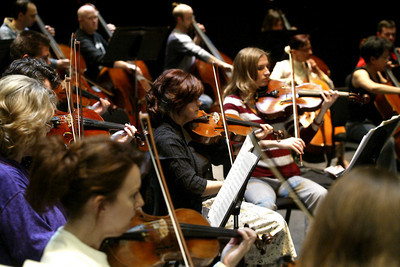Symphony Showcase

The third time’s the charm.
Not that David Itkin, the Las Vegas Philharmonic’s music director, wasn’t pleased with Franz Schubert’s Symphony No. 9, nicknamed "The Great," when he led performances by the two other orchestras he directs, the Arkansas Symphony and the Abilene (Texas) Philharmonic.
It’s just that "it’s one of my very favorite pieces," he notes.
Good thing, too, because Itkin wondered how he’d feel when it was the Las Vegas Philharmonic’s turn to perform it.
Schubert’s No. 9 will climax the Philharmonic’s Saturday "Masterworks II" concert in Artemus Ham Hall at the University of Nevada, Las Vegas. Leading up to it: Dmitri Shostakovich’s Ballet Suite No. 1 and Maurice Ravel’s Piano Concerto in G major, featuring guest artist Ilya Yakushev.
As for Itkin’s third go-round with the Schubert symphony, "I was afraid I was going to come out of it sort of blah, thinking ‘Oh, Lord, not again,’ " he acknowledges during a telephone interview from his home in Little Rock, Ark. Instead, "It’s my third try in six weeks and I’m still very excited."
In part, that’s because of the nature of the work itself, which Itkin describes as "so massive and so intricate" — which makes it "a real departure from Schubert’s other symphonies," he explains.
And, in part, it’s because of the nature of the Las Vegas Philharmonic, a musical ensemble that Itkin, in his first year as music director, still is getting to know.
"We had a wonderful week in September," Itkin says of the rehearsals for and performance at the Philharmonic’s first Masterworks concert.
The Las Vegas musicians "worked harder, with better spirit," than almost any other orchestra he’s conducted, Itkin says. (And that’s saying a lot, considering the conductor — who is also a composer with two Pulitzer Prize nominations to his credit — has worked with orchestras from Seoul to San Diego.)
"Even in a good orchestra, you see it in their body language, and in the look in their eye — they’re there to get paid," Itkin says. "They’ll play, but it’s (just) their job. That should never happen."
That hasn’t happened here, he’s quick to add.
"What we do has to matter to us," Itkin says, noting "it clearly matters to everyone" in the Las Vegas Philharmonic.
Then again, symphonic works as challenging as Schubert’s require maximum dedication from the musicians.
"It is extremely tiring for the orchestra," the conductor says of the symphony. "It’s very physically demanding," especially for string and woodwind players who have "almost no rests … they’re just cranking it out."
In addition to the physical and mental challenges, there’s an artistic challenge "to bring out the complexity of the work."
The "highly technical" symphony also fits in with Itkin’s strategy of mixing selections "the audience is comfortable with" alongside works that are "new and fresh — without getting so far to the new and fresh that we turn off" audiences.
Saturday’s other two selections exemplify that philosophy.
The Ravel concerto "was all Ilya’s doing," Itkin says of the Russian-born Yakushev, 26, a gold medalist at the 2005 World Piano Competition in Cincinnati.
Conductor and pianist first worked together last year, when Yakushev substituted for another pianist at an Arkansas Symphony concert, performing Sergei Prokofiev’s Piano Concerto No. 2 in G minor.
"He was marvelous," Itkin says of Yakushev. Initially, Yakushev thought they might repeat the Prokofiev concerto in Las Vegas, but Itkin "wanted something not as oftenly played," the pianist says during a telephone interview from his New York home.
Enter the Ravel concerto, which is "definitely one of my favorites," Yakushev notes.
The choice also suited Itkin, the conductor says, because "I love this piece."
Although the piece is "a highly demanding piece for orchestra players," in Yakushev’s view, its unusual orchestration gives it particular distinction.
"It’s very different from everything else," the pianist says. "It definitely has the flavor of jazz. It shows in the orchestration — the jazzy motifs and harmonies."
As a result, it’s a lot of fun for the audience as well as the performers, Yakushev says, describing the concerto as "light and joyful."
As for the Shostakovich dance suite, Itkin characterizes it as "my way of helping people who are ‘Shostaphobic’ get over it," he insists.
After all, in addition to the modern composer who alienates some audiences, "there’s a playful Shostakovich and a heroic Shostakovich," the conductor explains.
Saturday night’s selection "falls into the playful category," Itkin says, combining "six little miniatures that are just delightful." (Five of them come from the ballet "The Limpid Brook," while the sixth is taken from Shostakovich’s 1934 "Suite for Jazz Orchestra.")
Overall, the program showcases an orchestra that has "a great passion and a great determination" to make sure the Las Vegas Philharmonic succeeds, he explains — especially because two previous Las Vegas-based orchestras failed in their attempts.
"Surviving and keeping the institution alive and growing and relevant" remain central goals, in Itkin’s view. "You cannot depend on someone else to keep the institution alive," he insists. "It has to start with the people who play."
Contact reporter Carol Cling at ccling@reviewjournal.com or (702) 383-0272.